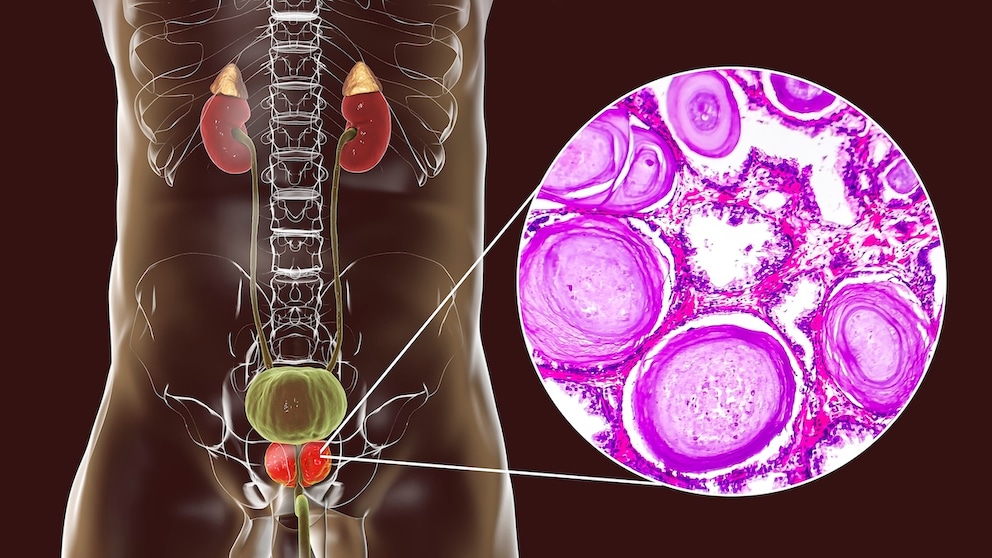January 20, 2025, 12:09 pm | Read time: 5 minutes
Prostate cancer is one of the most common forms of cancer in men in Germany. The disease is also common in other countries – men of African origin, in particular, are disproportionately affected. A study has now found a possible reason for this.
Previous studies have shown that men of African descent are not only diagnosed more frequently but also at a younger age and often with more aggressive forms of prostate cancer than men of European descent.1,2 Nevertheless, genetic testing of this population group has been rare. For the first time, an international research team supported by the US National Institute of Health (NIH) has conducted a comprehensive genetic analysis of African men. The results provide evidence that the risk of prostate cancer could be based on the presence of specific genes.
Table of Contents
Background of the Study
The aim of the study was to investigate the genetic architecture of prostate cancer in men from East, South, and West Africa.3 Scientists wanted to understand which genetic characteristics make them more susceptible to this disease. Prostate cancer accounts for almost a quarter of all cancer cases in Africa. Despite this high disease burden, there have been few studies on prostate cancer and genes within this population. “We have only really studied prostate cancer in European populations. By studying genetic risk factors in African men on a large scale, we may one day be able to improve screening and treatment,” emphasizes Dr. Carl Chen, researcher at the Sydney Brenner Institute for Molecular Biosciences at Wits University and second author of the study.4
Previously, it was thought that two possible genetic risk groups could be involved in the development of prostate cancer:
- Hereditary risk factors or germline mutations: The rare genetic mutations in genes such as BRCA1 and BRCA2 were previously associated with an increased risk of cancer. The latter mutation, in particular, is thought to be associated with prostate cancer.
- Single nucleotide polymorphisms or variants: These genetic variants can also increase the risk of cancer. Several variants together can even increase this risk.
For this reason, the focus of this study was also on these two genetic risk groups.
Examination of Nearly 7500 Genetic Samples
The research was carried out by the Men of African Descent Carcinoma of the Prostate. This is a consortium made up of hospitals and universities from five African countries. These are Nigeria, Ghana, Senegal, Uganda, and South Africa. The consortium is supported by the US National Institute of Health.
The researchers recruited 3963 men with newly diagnosed prostate cancer and 3509 men as a control group without cancer. They collected comprehensive data on demographics, socioeconomic status, clinical findings, and genetic material.
In order to investigate the genetic variations, a special genotyping array, specifically optimized for African genetic variants, was used. This technology can analyze hundreds of thousands of genetic markers or DNA variants simultaneously.
Study Results
The researchers identified three genetic regions (loci) that are strongly associated with an increased risk of prostate cancer: 8q24.21, 6q22.1, and 11q13.3. It is particularly noteworthy that the genetic signals found in these regions are specific to African populations and are almost completely absent in non-African populations. “The key ‘signals’ within these three loci are unique to African populations and would not have been discovered without studying African populations,” Chen explained.
The genetic variations in these regions, known as “private alleles,” are due to recent mutations. These were strongly influenced by the evolutionary history of African populations.
The study also showed that there are, nevertheless, genetic differences within the African regions. The risk of prostate cancer is not only influenced by the frequency of gene variants but also by their “effect size” (how strongly the variant increases the risk).

Besides Smoking Disturbed Sleep-Wake Rhythm Promotes the Development of Lung Cancer

Research How Diet Can Influence the Risk of Prostate Cancer

Harvard study 60 percent of the world’s population is deficient in 4 important nutrients
Significance and Classification of the Study
The study is the largest investigation to date into prostate cancer and genes in African men and provides important new findings. It represents a milestone in cancer research, especially for African men, who have the highest risk of prostate cancer worldwide. By identifying genetic risk factors that are specific to African populations, new avenues for early detection and prevention can be developed. “The findings from this study will form the basis for the development of risk prediction models using genetic data to improve the treatment of prostate cancer. With virtually no prostate cancer screening in Africa, the natural progression and genetic correlations of the disease can be studied without the influence of early detection,” Professor Michèle Ramsay noted.
Nevertheless, there are also some limitations. For example, genetic research in Africa is still limited due to a lack of the necessary infrastructure and funding. Although this study represents a major step forward, further research is needed to fully understand the genetic causes of prostate cancer and the underlying mechanisms. Furthermore, genetic factors are only part of the cancer risk. Environmental and lifestyle factors also play an important role, and these were not fully investigated in this study. Differences in medical care in the regions studied could also influence the results.

